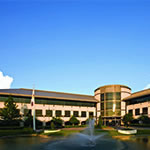To be responsible corporate citizens, companies need to be conscious not only of the quality of the goods they produce, but also the environmental impact of that production. Recognizing the importance of sustainable facility management, the International Facility Management Association (IFMA) created the Sustainability Facility Professional (SFP) credential to provide training and tools.

Lynn Baez
“As stewards of existing buildings and key contributors to building design, it is now a central part of a [facility manager’s] function to have an understanding of the footprint left behind by our building operations,” says Lynn Baez, corporate facility manager for Dr Pepper Snapple Group’s LEED Gold headquarters in Plano, Texas. Baez also manages environmental, health, and safety—commonly referred to as EHS—as well as environmental reporting for the business as a whole.
Baez earned her SFP in October 2012 while spearheading LEED certification for her facility. “I needed guidance in selling the concept of benchmarking, displaying financial benefit, communicating, and exhibiting the confidence to lead the LEED journey,” Baez says. “Earning the SFP provided a roadmap of my role to support the LEED project, which led to supporting [company]-wide environmental goals for our corporate sustainability initiatives.” The SFP program enables facility managers to drive change by communicating effectively, whether it involves weaving sustainability into their organizations’ values, presenting a business case for sustainability initiatives, or tracking and reporting efforts’ effects on the triple bottom line.
“The SFP provided the vernacular for me to articulate the operational and financial benefits of implementing sustainable processes,” Baez says. “Much of the language in sustainability can be misused if proper education has not been attained. The SFP gave me the knowledge and confidence to present our needs clearly.”
In addition to course materials and online and classroom training, the SFP program provides an opportunity for knowledge sharing among facility managers. Inspired by a fellow facility manager who successfully engaged employees in a sustainability initiative, Baez created an Intranet page dedicated to her LEED project that gave real-time updates and solicited feedback in building-wide surveys. “This made the employees feel connected to the initiative and led to significantly more buy-in than on a typical project,” Baez says.
Baez is happy to pay it forward by sharing what she has learned with others in the field. “I am a firm believer in continuing education, as it has played a significant role in my career,” she says. She now serves a member of IFMA’s Environmental Stewardship and Sustainability Strategic Advisory Group, which, in addition to drafting courses for the SFP that speak to the latest technologies and standards, is also in the process of launching an online community for facility managers interested in sustainability where they will be able to connect, share best practices, and continue the learning process.

